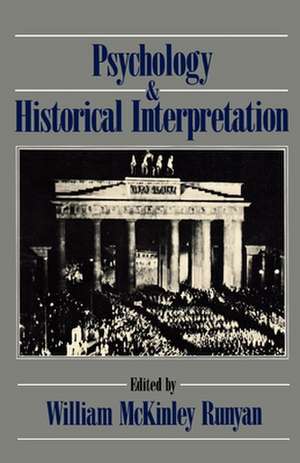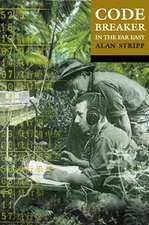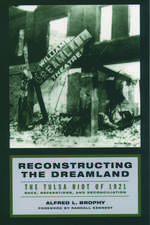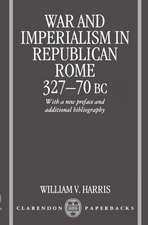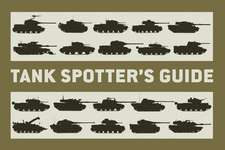Psychology and Historical Interpretation
Editat de William McKinley Runyanen Limba Engleză Paperback – 22 dec 1994
Preț: 328.77 lei
Preț vechi: 403.18 lei
-18% Nou
Puncte Express: 493
Preț estimativ în valută:
62.92€ • 65.44$ • 51.94£
62.92€ • 65.44$ • 51.94£
Carte tipărită la comandă
Livrare economică 03-09 aprilie
Preluare comenzi: 021 569.72.76
Specificații
ISBN-13: 9780195053289
ISBN-10: 0195053281
Pagini: 320
Ilustrații: 6 figures
Dimensiuni: 140 x 205 x 20 mm
Greutate: 0.36 kg
Editura: Oxford University Press
Colecția OUP USA
Locul publicării:New York, United States
ISBN-10: 0195053281
Pagini: 320
Ilustrații: 6 figures
Dimensiuni: 140 x 205 x 20 mm
Greutate: 0.36 kg
Editura: Oxford University Press
Colecția OUP USA
Locul publicării:New York, United States
Recenzii
Showing that psychological understanding need not be limited to psychoanalysis, Runyan develops a comprehensive conceptualization for the use of psychology in psychohistory, a harbinger of good things to come in this significant field.
Skeptical about psychohistory, I.... thoroughly enjoyed it. This is an honest, well-written, intelligent discussion of contemporary psychohistorical work.
Excellent summations and extraordinary formulations and furtherings of insight in this field. The contributors address key issues such as emotional involvement and countertransference; they also discuss advances in psychoanalysis as well as the limits of the discipline. Cases discussed include those of Alice James and Joseph Stalin. This book is essential for scholars, students, and general readers who are trying to keep abreast of developments in the field of psychohistory.
. . . significant interest and importance to practitioners of the social sciences in general. It offers a sophisticated, stimulating, and multifaceted discussion and critical analysis of most of the methods and some of the results of historical inquiry into the motives, perceptions, attitudes, actions, and interactions and as members of the various institutions of society.
Attempts to re-examine, perhaps even rehabilitate, the controversial field of psychohistory, and to provide a more comprehensive conceptual framework for analyzing relationships between history and psychology . . . . This volume is intended to suggest sounder conceptual foundations for the enterprise, and to advance and deepen the debate about the relationships among psychology, biography, and history.
It is a pleasure to read and study a well-written, well-researched, and scholarly collection of papers that focuses upon a specific topic. Here one explores new thinking, reflects on existing impressions and beliefs, and also has an aesthetic experience in following the course of the volume as it unfolds, travels here and there but stays on course and ends without dogmatic, simplistic, and reductionistic conclusions. Professor William M. Runyan is to be congratulated for the excellent product resulting from his careful editing, his painstaking research of the historical and conceptual background to psychohistory, and his selection of excellent scholars who present their ideas clearly.
The contributors to this collection have demonstrated a willingness to confront the problems and difficulties of making psychological contributions to historical interpretation. . . The introduction and conclusion by Runyan are particularly valuable. He presents a brief but useful history of psychohistory and an analysis of the impressive quantitative growth of the field. Finally, his reconceptualization of the relationships between history and psychology shows real promise of putting psychohistory on a more solid theoretical foundation.
[Runyan] has taken a valiant stride towards broadening the theoretical repertoire of 'psychohistory.'
Skeptical about psychohistory, I.... thoroughly enjoyed it. This is an honest, well-written, intelligent discussion of contemporary psychohistorical work.
Excellent summations and extraordinary formulations and furtherings of insight in this field. The contributors address key issues such as emotional involvement and countertransference; they also discuss advances in psychoanalysis as well as the limits of the discipline. Cases discussed include those of Alice James and Joseph Stalin. This book is essential for scholars, students, and general readers who are trying to keep abreast of developments in the field of psychohistory.
. . . significant interest and importance to practitioners of the social sciences in general. It offers a sophisticated, stimulating, and multifaceted discussion and critical analysis of most of the methods and some of the results of historical inquiry into the motives, perceptions, attitudes, actions, and interactions and as members of the various institutions of society.
Attempts to re-examine, perhaps even rehabilitate, the controversial field of psychohistory, and to provide a more comprehensive conceptual framework for analyzing relationships between history and psychology . . . . This volume is intended to suggest sounder conceptual foundations for the enterprise, and to advance and deepen the debate about the relationships among psychology, biography, and history.
It is a pleasure to read and study a well-written, well-researched, and scholarly collection of papers that focuses upon a specific topic. Here one explores new thinking, reflects on existing impressions and beliefs, and also has an aesthetic experience in following the course of the volume as it unfolds, travels here and there but stays on course and ends without dogmatic, simplistic, and reductionistic conclusions. Professor William M. Runyan is to be congratulated for the excellent product resulting from his careful editing, his painstaking research of the historical and conceptual background to psychohistory, and his selection of excellent scholars who present their ideas clearly.
The contributors to this collection have demonstrated a willingness to confront the problems and difficulties of making psychological contributions to historical interpretation. . . The introduction and conclusion by Runyan are particularly valuable. He presents a brief but useful history of psychohistory and an analysis of the impressive quantitative growth of the field. Finally, his reconceptualization of the relationships between history and psychology shows real promise of putting psychohistory on a more solid theoretical foundation.
[Runyan] has taken a valiant stride towards broadening the theoretical repertoire of 'psychohistory.'
